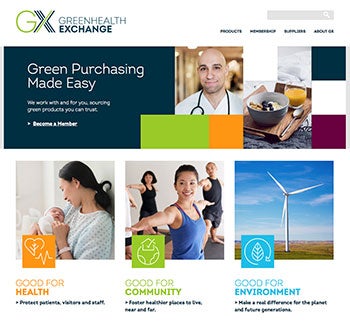Health care leaders launch green supply chain

GX is a for-profit purchasing cooperative founded by Dartmouth-Hitchcock, Dignity Health, Gundersen Health System and Partners HealthCare along with sustainability advocates Health Care Without Harm and Practice Greenhealth.
A group of health systems and leading sustainability organizations launched a new purchasing organization called Greenhealth Exchange (GX) that will enable hospitals to buy safe, green products more easily.
GX is a for-profit purchasing cooperative founded by Dartmouth-Hitchcock, Dignity Health, Gundersen Health System and Partners HealthCare along with sustainability advocates Health Care Without Harm and Practice Greenhealth. The program was announced May 17 at the CleanMed 2016 Conference and Exposition in Dallas.
GX is backed by a combined total of 60 hospitals in the four systems that together represent $21.2 billion in annual revenues and more than $4 billion in purchasing power.
GX is developing a network of suppliers and expects to launch an online catalog of products in approximately six months. GX is setting product specifications and developing screening criteria to identify products that meet the needs of our health care members for performance, cost, and environmental, health and community benefits.
GX will offer members access to:
- High-quality green products brought together in one catalog and at competitive prices.
- Direct comparisons on key product features, including price and sustainability score, plus health, environmental and community benefits.
- Tracking and reporting the benefits associated with every purchase.
“With the support of our members and supplier network, we will promote the adoption of products that support healthy people, a healthy environment and healthy communities,” says John Strong, GX president.
GX is unique because it will sell only green products, he said at a press conference where the launch was announced. “This should give hospitals much easier access to high-quality green products at competitive prices,” he says.
Among products GX is initially looking to offer are furnishings, food services, office supplies, medical equipment and devices, and respiratory products used in the neonatal intensive care units. He expects the number and scope of products to grow over time, Strong says.
“As we ramp up, we will get more robust in other areas of medical products that use plastics in particular. A lot of plastics are used in health care,” he says.
Conversations with additional major health systems are underway and Strong says he expects more to join GX before the catalog goes live this fall. Health systems and hospitals that want to participate in GX must become members.
Health care organizations in the U.S. purchase more than $300 billion worth of goods and services each year, accounting for 17 percent of the marketplace.
Strong says the volume of health care purchasing puts hospitals and health systems in a strong position to accelerate the adoption of products that are safer and spark innovation in the supply chain.
Leaders from the founding health systems driving GX are confident the organization will make purchasing sustainable products easier and fulfill an important mission.
“We know the health of our communities and the health of our planet are inexorably linked,” says Sister Mary Ellen Leciejewski, OP, director of ecology, Dignity Health.
“Using high-quality products and processes for our patients that are also eco-friendly has long been a priority for Dignity Health. Greenhealth Exchange will help to further this mission both for Dignity Health and the health care industry as a whole,” she says.
GX will build on the efforts of Health Care Without Harm and Practice Greenhealth to help hospitals overcome price and availability barriers to green purchasing.
“Purchasing quality green products will soon become much easier for health care,” says Gary Cohen, president and co-founder and president of Health Care Without Harm and president of Practice Greenhealth.
Cohen says that GX can help to supplement the purchasing of health systems that already have relationships with other group purchasing organizations. He foresees that GX may inspire them to follow GX’s example of selling green products.
“Supplies and equipment have as big, if not bigger, impact on the environment as [does] our energy use and waste management,” says Jeff Thompson, M.D., executive advisor and CEO emeritus, Gundersen Health System.
“That’s why Gundersen is committed to Greenhealth Exchange. So we can aggregate demand, identify products that will lower cost, be more sustainable, and enhance the well-being of patients and our communities,” he adds.
For more information or to become a member, visit Green Health Exchange.




